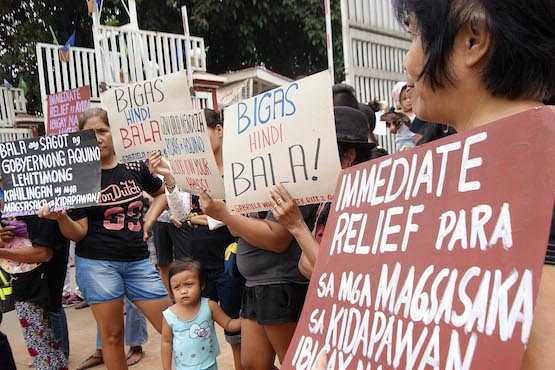
Urban poor settlers in Manila call for immediate relief for farmers and tribal people in Mindanao who suffer from the effect of drought. (Photo by Mike Taboy)
In the past several weeks, the culturati in Manila shelled out more than US$100 for the privilege of weeping over the hit musical Les Miserables' scenes of dire poverty and injustice.
Some 1,580 kilometers away in the southern city of Kidapawan in Mindanao, the demand for food by hungry farmers sparked a bloodbath that left at least three dead and more than 100 injured.
Unlike the fictional barricades of Victor Hugo's novel where rebellious youth were felled in the night, the Kidapawan "human barricade" was dispersed in the middle of the day.
After a three-day standoff, policemen rushed protesters, flailing batons, sparking a rock-throwing melee followed by gunfire from heavily armed police commandos.
Television reports showed cops beating up arrested protesters and firing at those who tried to flee. The regional head of the state's Commission on Human Rights sidestepped bureaucratic protocol and announced that police had shot at kneeling farmers and injured people crawling on the ground.
Later in the day, scores of arrested protesters have been charged with criminal offenses. At police headquarters, policemen received medals for the carnage.
The incident convulsed social media. The digital news portal rappler.com reported that the #BigasHindiBala hashtag had 63.5 million impressions over two days. The publicity fueled independent efforts to raise 15,000 sacks of rice needed to tide over the families of hungry farmers.
Cold, cold hearts
Just like in Hugo's masterpiece, officials responded with coldness, arrogance, and lies.
The police, on orders of Cotabato Gov. Emmylou Mendoza, blocked food donations for protesters who had sought sanctuary at the fellowship facility of the local United Methodist Church.
Armed policemen prevented supporters from entering the compound. An ecumenical fact-finding team reported that its members were initially denied access to wounded protesters in hospitals.
Meanwhile, Mendoza threatened legal sanctions against a Protestant bishop for harboring the farmers. The mayor of Kidapawan followed with a threat to rescind the church's business permit.
It's not the first time church workers have been harassed by the state.
Just like in Hugo's novel, religious groups played an important supporting role in the real-life drama in Mindanao — as they always have in the Philippines' long history of civil unrest.
Ministering to the poor
Churches in the Philippines minister to the poorest citizens and are immersed in their experience of oppression. Various faiths preach helping the least of one's neighbors, believer or not. Churches are seen as allies in the fight against injustice and earn the ire of the powerful.
Several nuns, pastors, priests, and lay workers were slapped with "human trafficking" charges a few months back for helping tribal people escape paramilitary attacks in the provinces of Davao. Several Catholic priests have already been murdered because of their involvement in justice campaigns. Others more currently face death threats.
But Catholic priests, nuns, seminarians, Protestant pastors and lay people are unfazed. This time in Kidapawan, more have come to aid protesters.
"We stand with the poor farmers and tribal people to condemn this ruthless and violent dispersal," said the ecumenical group Promotion of Church People's Response.
"We demand that calamity support be immediately given to those stricken by drought in Mindanao. May our hearts be moved with compassion. These cries for food deserve a human and caring response."
The Ecumenical Bishops Forum and the Redemptorist missionaries also demanded an independent probe and urged authorities to hold accountable the officials who ordered the policemen to open fire at the protesters.
Debate over aid
The government, caught on the defensive, betrayed its priorities by dodging the issue of why aid was being withheld and why it has slashed 2 billion pesos off the agriculture department's request for El Nino mitigation funds.
Instead, top government officials demanded to know who had fed the farmers during their mass action and slammed aid coming in for besieged protesters, warning of its diversion to communist rebels.
The government's response is a throwback to events more than two decades ago on another Philippine island in the throes of civil unrest.
"A hungry stomach knows no color," said the late Bishop Antonio Fortich of Negros in 1989. Negros island is the Philippines' sugar capital and is dubbed a "social volcano" where luxury vehicles of plantation owners crowd the streets while those who toiled for the prized crop watch their children die from malnutrition.
In the rebellious southern districts of the island, the late President Corazon Aquino's military had launched Operation Thunderbolt, a massive program to deny communist rebels its mass base.
Troops herded communities into schools, depriving them of their already meager livelihood. When congested conditions fueled a measles epidemic, the military blocked doctors from reaching the area, leading to the deaths of dozens of already frail children.
Soldiers also barred church food missions to refugees, claiming supplies were being diverted to communist rebels.
Bishop Fortich had to lead a church delegation, and delivered a sermon that made headlines around the world.
Aquino's son now heads a nation touted for its glowing growth figures and growing income disparity between the few rich families and the rest of the country.
Then and now, demands for food and justice are met with bullets. Then and now, solidarity with the poor remains dangerous work.
The only bright spot in this sordid episode is that, then and now, many Filipinos of various faiths and political persuasions do believe that compassion knows no color.
Inday Espina-Varona is editor and opinion writer for various publications in Manila.


